California cities rattled by prostitution, human trafficking in broad daylight as cops pin blame on new law
San Francisco neighborhood overrun with sex workers, ‘terrible policy’: Shellenberger
Founder of Environmental Progress and author Michael Shellenberger says street prostitution increased after Gov. Gavin Newsom signed legislation that decriminalizes loitering for prostitution purposes.
Women wearing thongs in broad daylight on street corners, pimps following mothers taking their kids to school, and prostitutes twerking at traffic have become common scenes in California.
Local leaders claim human trafficking and prostitution are rampant in the Golden State after a new criminal justice reform that its author said aims to protect transgender women from being unfairly targeted by law enforcement.
"It’s absolutely out of control and dangerous — not just for the sex workers but for the community," San Francisco Supervisor Hillary Ronen told the San Francisco Chronicle this week.
A road in the heart of San Francisco’s Mission District has become lined with prostitutes and pimps, prompting city officials to install barricades as residents sound off that not only do they feel less safe – especially at night – but that they are worried about the women working the streets.

"From the window right there, I’ll see three [people] ganging up on a girl," one San Francisco resident told the Chronicle while pointing toward a bay window that overlooks an intersection. "They’ll be hitting her."
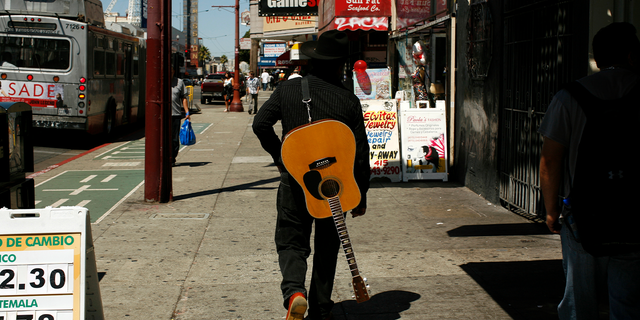
A man carrying a guitar looks for a place to play music in the Mission District in San Francisco. (Reuters / Robert Galbraith / File)
"I call the cops; no one comes. There’s nothing I can do," the unidentified woman said.

The issue isn’t isolated to just San Francisco, with other major cities such as Los Angeles and Oakland reporting the same.
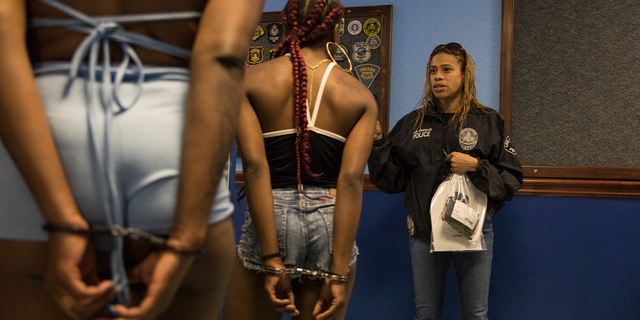
An officer of the Los Angeles Police Department's vice squad, right, speaks to two recently arrested women in the 77th Division police headquarters in Los Angeles. (Robert Nickelsberg / Getty Images / File)
Pimps in Oakland have reportedly stationed prostitutes outside a Catholic grade school, where parents said they walk their kids to school past women wearing next to nothing – or even naked.
"It's every day, during all periods of the day," mother Rosa Vargas told ABC 7. Vargas claimed that pimps have even followed Vargas down the street on a couple of occasions. Some of the prostitutes look very young and are likely underage, according to residents and local leaders.

Police departments and Republican leaders in the state are pinning blame for the overt prostitution on a new law that went into effect on Jan. 1. Senate Bill 357 repealed a previous law that banned loitering with the intent to engage in prostitution.
"California Democrats' policy of legalizing crime is creating more victims by the hour," GOP Assembly leader James Gallagher said in a statement.

"Under Democratic rule, families and businesses are moving out, while human traffickers are moving in," Gallagher added. "It was clear from the get-go that this law would encourage and enable human trafficking, but that was apparently an acceptable result for the lawmakers who backed it."
The original bill was introduced by Democratic state Sen. Scott Wiener, who argued it will protect transgender women whom he said are disproportionately targeted by police.

"[The previous law] allowed police officers to arrest a person, not based on what they did, but based solely on how a person looks," Wiener recently told KGO-TV. "So, an officer could arrest someone because they were wearing tight clothing, high heels and extra lipstick."
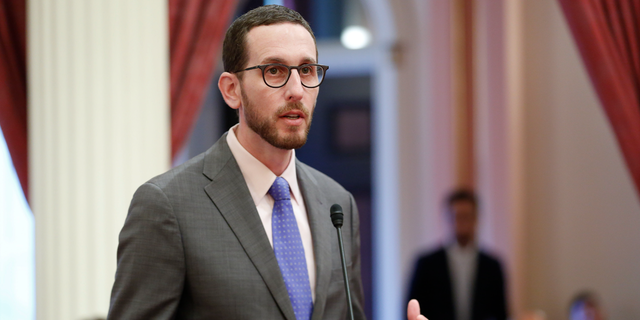
California state Sen. Scott Wiener (Scott Wiener)
Wiener stressed to Fox News Digital earlier this week that prostitution and human trafficking issues have long plagued certain areas of California, and he called what people are seeing in Oakland "unacceptable." But he stood by the reform.
"The police's hands are not tied," Wiener told local media. "They can arrest people for soliciting, they can cite vehicles that are stopped in the middle of the street, they can arrest ‘johns,’ they can arrest pimps."

The Coalition to Abolish Slavery & Trafficking (CAST), which is one of the largest and oldest direct service providers for sex and labor trafficking survivors in the U.S., threw its support behind the bill and told Fox News Digital that it endorsed repealing the former policy "because we know that reducing the criminalization of survivors will help prevent human trafficking."
"Traffickers rely on our systems to criminalize victims so that they are unable to access safety due to their records and are vulnerable to continued exploitation," Leigh LaChapelle, CAST's associate director of survivor advocacy, told Fox News.
"The impact of these encounters with law enforcement reinforce already heightened stigma when someone is arrested for this offense due to the difficulties securing employment and safe housing with an arrest record relating to the sex trade," LaChapelle added. "Violation of this discriminatory law also puts immigrants in jeopardy of deportation, loss of residency or denial of reentry due to a misdemeanor conviction."

LaChapelle noted that the law has only been in effect for little over a month and said leaders in the state "need to look at the larger, long-standing systemic issues that are contributing to any potential rise in trafficking in California, such as homelessness."
But Los Angeles police sources who spoke to Fox News Digital said the law is "definitely" handcuffing them from cracking down on prostitution. The police said that because of the reform they can only make arrests if a suspect admits to prostitution, which they said is a rarity.
L.A.’s Figueroa Street, also known as "The Blade," has become inundated with prostitutes and pimps, according to the police. Law enforcement officials provided social media accounts to Fox News that showed young women wearing thongs and fishnets, often with their breasts exposed while standing – and even twerking in broad daylight on street corners.

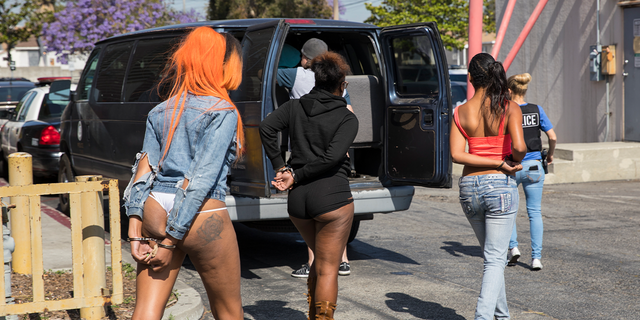
Los Angeles police sources who spoke to Fox News Digital say the new reform law is handcuffing them from cracking down on prostitution. (Robert Nickelsberg / Getty Images / File)
Police said with the emboldened prostitution rings come robberies, shootings, aggravated assaults and other crimes. Many of the pimps are gang-affiliated and take no issue with beating women or going after rival pimps who try to poach one of the workers, they said. Some even record the beatdowns because they "think it’s funny," police said.
The Oakland Police Department told Fox News Digital that the new law "now hinders officers' enforcement across the state."

Prior to the law going into effect, the department’s "traffic unit and patrol officers conducted high visibility patrolling," noting that the officials’ "hope is that the increased presence in different areas by these officers deter activity and do not revictimize those who are victims of human trafficking."
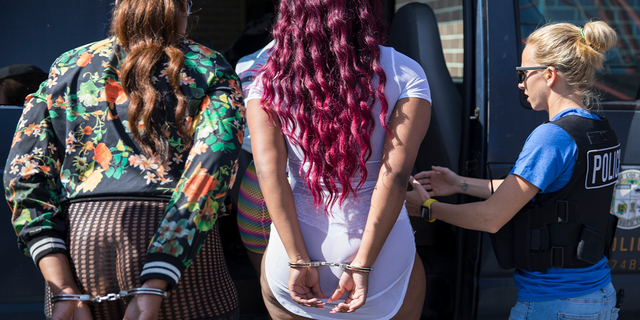
An officer with the Los Angeles Police Department's vice squad oversees the loading of 13 women arrested earlier in the day into a van in Los Angeles. (Robert Nickelsberg / Getty Images / File)
LaChapelle argued that police still have "many points of intervention available" to "investigate trafficking without arresting those who have not committed a crime," and they said that "jail is not outreach, and it certainly is not services."
"Using arrest as a gateway to receiving services is harmful and creates distrust in our communities," LaChapelle said. "One thing that CAST has heard from our clients on countless occasions is that being arrested was not only traumatizing and revictimizing but created insurmountable barriers to seeking employment, safe housing and immigration relief."
Oakland City Council President Nikki Fortunato Bas has been focused on human trafficking issues in her district since 2019, when she took office. She told Fox News Digital that she is working on the root causes of human trafficking and to not simply moving the prostitution rings to another community.
"It's a big issue. It's an issue that impacts many communities in California and outside California and has been going on for decades," Fortunato Bas said. "And so my approach has been to look at a comprehensive approach that includes law enforcement that is focused on the exploiters."

Oakland City Council President Nikki Fortunato Bas (City of Oakland)
She said she has zeroed in on exploiters and highlighted that the police department is working with the district attorney's office to build up enough evidence for prosecution. The city has increased the budget for its Department of Violence Prevention to deploy more violence interrupters on the streets, she added.
Her office has also worked to install speed bumps and better lighting on certain streets and launched other "Crime Prevention Through Environmental Design" initiatives, such as traffic diverters.
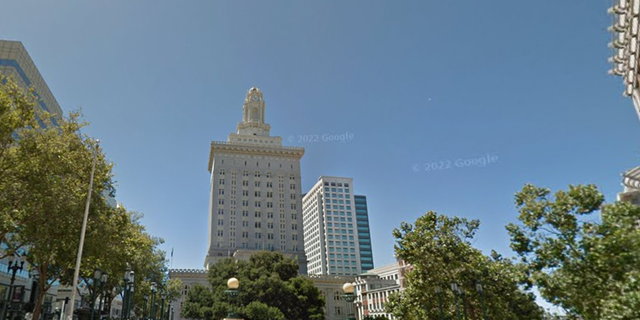
Oakland City Hall in California (Google Maps)
"Violence prevention and the outreach to offer victims services, including housing, job training, even food, as well as working with the district attorney to provide more protection for victims who are willing to speak out" is paramount in her fight against human trafficking and women being exploited, she said.
LaChapelle added in a comment to Fox News Digital that the issue of funding amid discussions on prostitution and human trafficking need to be taken into account.
"In June of 2021, the California legislature passed CAST’s $30 million request to fund human trafficking victim service providers over three years," LaChapelle said. "This additional $30M came at a time when numbers of urgent human trafficking cases are at an all-time high.
The group is advocating for the funding to be extended, she said.
"Arresting survivors is not the answer when we are struggling to fund enough shelter beds and services," LaChapelle said.
Fortunato Bas said it’s "premature" to make a declaration on the alleged issues of the reform as the new law has only been in effect for roughly a month.
But police sources equated the new law to California’s Proposition 47, which lowered felonies to misdemeanors for theft of goods valued at $950 dollars or less. Critics argued that sparked a shoplifting and smash-and-grabs explosion across the state, with multiple instances of flash mobs running into high-end stores with crowbars and bats to break display cases and run off with ritzy merchandise.
For now, police said they are bracing for the issues to only get worse and have called on state and city leaders to go on ride-alongs to see the illegal activity for themselves.






.jpeg)
Comments
Post a Comment